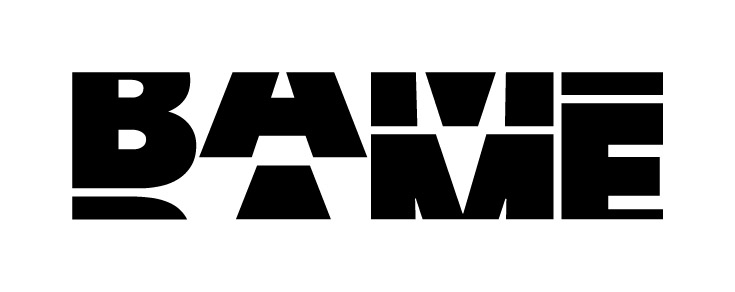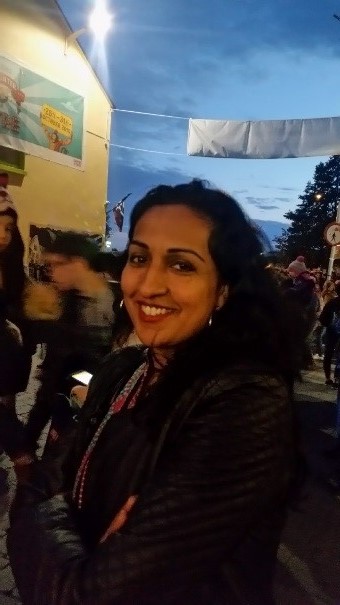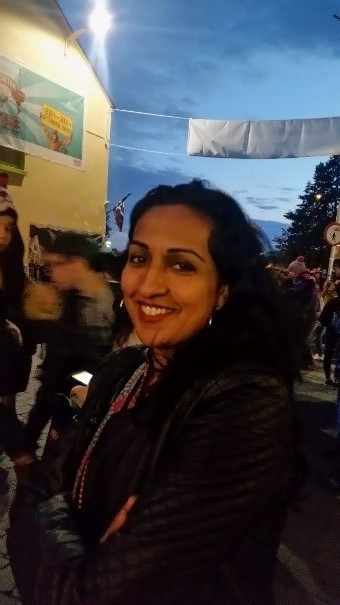
‘Check the time and date properly on the ticket. I don’t want us getting a fine. I’m still paying off your brother’s overdraft,’ said Mum, as she pulled herself out of the car.
I was pleased they had come. When they called this morning, I thought they were calling to cancel. It being a Saturday and we all knew what usually kicked-off on a Friday night. The police were well versed to the goings-on. But here they were. ‘This is a Bengali area – Tower Hamlets. You know, there were race riots here,’ I said.
‘We had them too, in Southall, when you were little; Dad was there…they had to board up the shops,’ said Mum.
Dad strolled ahead. He reminded me of a lion assessing his new territory – West London boy checking out East-side. He had worn a kurta pyjama and his Nehru style waist-coat. Mum too had made an effort, freeing herself from the invisibility of the colour brown, a much-loved attire of the older Indian matriarch. ‘There’ll probably be food at this place. I hope so. Indian events are good like that,’ I said.
Inside the building it was reassuring to see other Indian faces of all ages, with a sprinkling of Caucasian folk. My theatre experience reversed, I thought. We smiled at fellow guests, acknowledging that we were all part of some secret. ‘Hola-Mela’ doesn’t really get much publicity in the UK, but it is a huge event in North India – a festival attended by thousands of Sikhs from all over India, which show-cases their martial arts and horse-back riding skills.
The screen came down and suddenly we were transported to a dusty crowded field in Anandpur Sahib, Punjab. Watching a sea of Nihangs donned in their midnight blue loose cotton clothing, and their one metre plus turbans, adorned with Sikh symbols that could also be used as weapons, if required. ‘There’s Gill Chacha!’ said dad.
‘Is it? Is he there?’ said Mum with equal high volume.
‘SSShhhh. You’re making too much noise,’ I said, as I slouched low into my chair.
‘It’s him I tell you,’ repeated Dad.
‘I think it is, you know. He said he was going.’
‘Mother, will you please speak quietly. Are you even wearing your correct glasses?’
‘Nothing wrong with my eyes. It’s him. I wonder how he got there. Wasn’t he going to have a hip operation?’
‘Oh, there is again, did you seem him? Doesn’t he look smart?’ gleamed Dad.
‘I can tell these samosas are Bengali samosas. Our Punjabi ones are much bigger,’ said mum as she added two to her white paper plate and dabbed a teaspoon of chutney on the side.
‘You’re only saying that, cos I told you the area we’re in. You wouldn’t have guessed otherwise. Get a seat, I’ll bring you chai,’ I replied.
‘They’re not bad, these Bengali samosas. Isn’t that woman’s suit nice? Wished you’d made more of an effort. You look lovely in your salwar kameez.’
‘See Dad’s made a new friend.’
‘No doubt, your father will be telling the man his own Hola-mela experience. Go get me another samosa please, they’re not bad these Bengali ones, even if they are on the small side.’
‘See, good we went, isn’t it?’ I said, as I switched the kettle switch on.
‘Wasn’t that Black girl good. With her high kicks and sword carrying spins. She knocked the shield right out of that guy’s hands. She must do a lot of exercise,’ said mum, as she began unpacking her food drop.
‘Is the chai ready? We’ve been getting late phone calls …. did your mum tell you? …last night there were two young lads, came knocking at the door. Late it was…10pm. They ran off when I opened, shouting it was the wrong house.’
‘Is the number blocked? Did you call the police?’
‘Numbers were blocked. The police don’t do anything. They don’t care, said he’s an adult,’ said Dad.
‘That’s because you both keep letting him back in…. How many times? How much time… energy…. ’
You know what happened at Christmas. You saw it yourself. He got worse outside the house. What was the point? And all that money wasted, we’re still paying it off. Why can’t they just send him to hospital? Make him better.’
‘Because they can’t. We’ve been through this, Mum… and you supporting him… paying his debts…doesn’t help.’
‘Well at this rate there is no other way. Either he will be harmed, or he will harm. I don’t know how he can put so much drink away. I mean, we drank back in the day. But not like that. I found white powder in his pockets, you know. In a paper ball,’ said Dad.
‘He was surrounded by the drink, as a kid. That’s what happened. Your side, that’s all you lot did. Morning till night. Drink, drink, drink,’ said Mum, as she put her empty Tupperware into her bag and started reaching for her coat. My head was beginning to ache. I knew what was coming next. ‘I’ve lost my son.’
‘Mum, you know he’s not well. It’s no-one’s fault.’
‘How can it not be? He grew up smelling booze.’
‘See this is what she does. All day. Bloody every day. As though she’s the only one pained. What respect do I have when she’s screaming at me in front of him?’
‘Well, perhaps you should have thought of…’
‘Mum. That’s enough. Stop. Please.’
‘I know where it is. I’ll meet you there.’ With those words Dad had hung up.
That was a week ago. Now we were standing in an inconspicuous car-park, in front of a unit, that looked like a grown-up’s lego construction, that could be easily transported to other places as and when needed. I was sure the woman on the phone had said it was an old church because the words had immediately filled me with dread, thinking Dad would be inclined not to attend.
Dad had dressed up with a shirt, tie and blazer, the colour of the shirt complemented his turban. Appearances mattered to him, they always had. ‘A man must appear in the world as he wants to be respected. We’re descendants of a martial race: warriors.’ Those were the stories he had nurtured us with. Mother had her own stories. ‘Bone-idle-lazy and poor is your father’s blood-line.’ She had a point, to a degree, especially when there wasn’t enough flour in the house, and Dad would stride in with his mob on a Friday and Saturday night, after the pubs had closed, fuelled high with the brown liqueur dancing through his veins and gallant Punjabi folk songs blaring through his vocal chords. I could recall the record player, the needle poised momentarily inspecting the spinning record below like a general
inspecting a line of saluting soldiers in uniform. The next morning our front-room would be littered with record sleeves with the portraits of sturdy turbaned men, with a defiant index finger raised in the air imitating portraits of men before them who had gone off to battle, together with empty whisky bottles and glasses still aching from yesterday’s abandoned dreams.
But that was then.
Inside it was light. With colourful posters and messages on the walls. Welcoming. I looked for the politically-correct messages in other languages but didn’t spot any.
Dad and I waited, hesitant, not sure which of the rooms to enter.
‘Are you here for the 10am?’ a woman in her 50s, with soft blue-eye shadow, inquired.
‘I think so. Are you Daphne? Sorry, this is my dad,’ I said.
‘No, Daphne couldn’t make it. But she passed your message onto me. I’m Jane.’
We shook hands and followed Jane. I was no longer sure if this was a good idea. Daphne had said she would be here. Already, I sensed Dad’s interest waning.
We entered what reminded me of a classroom – many desks joined together with chairs. Dad and I unsure which seats were already allocated, sat to one side.
There were nine people. Majority women, apart from two other men and Dad, which made three – the Musketeers, the thought made my insides smile: one Indian and a Caucasian man, who made no eye contact. I was surprised, yet relieved to see an Indian face.
‘Hello everyone, a warm welcome, both to our new and existing friends.’ Jane looked our way and smiled.
‘Daphne couldn’t make it today, so, I will chair today’s meeting.’
Some of the women looked over at us and smiled sympathetically. I felt like an animal at the zoo and I wondered if they’d ever had one of our kind, at such meetings before?
Books were being passed round. I hoped it wasn’t the Bible. Not that Dad had any cause with Christianity – he often politely heard Sunday worshippers, at our front door, give their spiel, stood patiently waiting for them to finish, and then respectfully took what-ever leaflet they had, even though he told them at least ten times he had his own faith. He especially felt concerned for the Jehovah witnesses, wondering why they didn’t check the weather forecast, as they always tended to pick the worst weather to come knocking. He once made the mistake of inviting them in, for tea, out of the rain, and three hours later they were still trying to ‘show him the way’. After that our net curtains twitched a hundred times before we had the all clear to open the door on Sundays.
‘Please turn to page 45 – Chapter 4. Who would like to start us off, do we have any volunteers?’ asked Jane.
The room recoiled.
I remembered Mum’s words that we had to always sing for our supper, and I felt obliged to volunteer. But I didn’t.
Jane started reading and Dad had opened the book to the advised page number. He couldn’t read English well, and hadn’t brought his glasses, but he held the book open, as an actor wanting for his part in an audition.
I tried to follow Jane as she read, but my mind wondered back to bedtime stories with Dad. It was a book like the one I was holding now, perhaps slightly larger, that was used to hide a gun to assassinate the former Lieutenant Governor of Punjab. That was how my siblings and I were first introduced to the unforgettable story of Udham Singh. My eight-year old heart, like that of my younger siblings, was giddy from anticipation holding onto Dad’s every word, our duvet pulled high up to our chin, we lay as still as the blades of grass that refused to bow under the weight of early morning dew. As our bedtime story unfolded, we were right there beside Udham Singh, as he crawled out from under the bodies of the dead, as he searched for his family – we too knew what his anguish felt like, for had we not also, weeks prior, lost sight of our parents at Heathrow airport. We rooted for Udham Singh, as he plotted to take his revenge against British colonialists, responsible for the massacre of innocent men, women and children. Dad’s stories carried us away from our working-class streets, where Irish pubs blared out revolutionary songs late into the night, away from rows of sad looking houses, to Amritsar, to the golden temple/Harmandir Sahib that was built within holy water that we were told had the magical power to make all our problems disappear. I used to dream that the waters would heal my eczema. Now I was recalling our first family trip to Amritsar. Dad wanted us to see for ourselves what the British had done on the 13 April 1919. We had entered the court-yard, where the massacre had taken place. As I squinted in the hot sun, I tried to visualise where Udham Singh had hidden, for he would have been the same age as my brother then (9 years old). We made our way slowly, curiously, to the deep water-well, described in Dad’s stories, and we looked down into the dark water, our staring reflections scared us, as we thought we saw the ghosts of the children who had drowned, as they fled angry bullets – a swarm of deadly flying cockroaches. I had wondered if the bricks could speak what would they say? They still carried the gun-shot wounds, deep scars like chicken-pox marks that never fade.
Later we would proudly tell Dad how we raised our hands high in our history lessons, and informed infuriated red English faces that they were forgetting crucial details, educating them on stories they refused to learn, and with facts that stung their ears.
But that was all a long time ago. Our one and only holiday, all together. We haven’t been on a family holiday in a long time. Not since the disease.
Jane continued to read to the end of the verse. Dad waited patiently for the cue, and together in one synchronised movement we all turned the page, an army of albino-one-winged butterflies fluttered helplessly in the air.
‘Are there any sharings or reflections? asked Jane as she looked around the room.
Dad and I looked down, avoiding her gaze.
It was the Indian man that broke the silence.
‘I was reading this chapter during the week. It provided me with solace. It’s been a tough week… my daughter… she was doing so well…she had enrolled in an evening course…my wife…we all were so pleased…thought it would be a positive turn in our road… she dropped the kids over at ours…on her first day…, you know she was such a bright girl at school. So smart. Before she got sick…before the illness…she was going to go to uni…sciences, that’s what she said ‘not enough female scientists’ …so she came over last week, dropped her twins off. ‘I’ll be back soon’, she said… ‘Wish me luck’…we haven’t heard from her since…been five days now…’
He had a gentle voice. Educated. I took in his demeanour. His blue sweater, the rimmed glasses, his slight parting, his carefully clipped finger nails. I took it all in, ready to feedback to Mum. ‘See Mum, the disease…it’s not just us, there’s others suffering too…it doesn’t discriminate.’
‘It’s hard, mate. It’s bloody hard. The demons come in. I’ve been there. There ain’t nothing you can do,’ added the English man.
I hadn’t expected the English man to respond first, or to sound like he did. His voice had a soft Geordie accent. He reminded me of a truck driver in a Yorkie chocolate advert, with his big bulky hands, and the belly of a man well practised dart playing.
The woman opposite me, with the white/grey hair tied up loosely in a French roll cleared her throat. ‘Thank-you for your sharing. I have a daughter too. She had her birthday last week. You know she never liked birthdays, ‘all that fuss,’ she said ‘for just one day’… No, she’s never enjoyed them. I love birthdays. You know…it’s a celebration isn’t it? Take some photos… memories… But even when she was a little girl, she didn’t take to them, even when she knew she would get so many presents … easier days… those earlier ones. I knew she wouldn’t want a fuss, I told her da… So, I thought I’d invite her for tea a few days before her actual birthday… you know just the three of us, her, her da and me. She’s been doing ever so well… and we just wanted her to know how proud of her we are. It’s been a journey…I made a cake, just a small simple one. I stopped baking years ago… no one to bake for… her da weighed the flour… my eyes are going, can’t see the numbers on the scales, so well… and we waited, thinking maybe she was caught in traffic. You know, the traffic up Hanger Lane can be brutal on a Friday evening. At first, we didn’t call… what with her driving… be dangerous… but then the hours went by… so we tried but the number… wouldn’t go through. No bell…’She probably hasn’t charged it’, I said to her da. The battery goes ever so fast, off these new ones… The 9’ O clock news came on, so we watched that, I had the volume down low, one eye on the door, so as not to miss the bell… Her da grew tired… he’s an early riser… I said I would be up, have another cup of tea, thought I’d look over the cross-word once more…there was no word from her…I eventually went to bed around 11pm, only to be woken with a call at around 4.30am. I didn’t know who it was at first. Thought I was still in a dream … didn’t recognise the voice ‘… is that you…Ma… Ma?’ and then it started, ‘Happy Birth-day… to me, Happy Birth…day to …’ ‘Lisa, Lisa is that you?’ I couldn’t find the lamp switch… I was fumbling in the dark… all the time hearing her sing… 34 now…20 years I’ve been coming here. 20 years… I have my own celebration here now… the anniversaries of coming…I would be lost if I didn’t have this place…’
I sat admiring how her eyes never once got watery. Her voice never faltered. Calm. Yet, I had had to bite my lip and blink hard, to push back the water gathering in my eyes. She turned her wedding ring, and then looked straight at me. I wasn’t sure if she expected me to respond. ‘How are you both?’ she asked.
Dad mumbled ‘Ok. Everything ok.’ I half-smiled. But she waited and so did the others in the room. I was suddenly conscious of outside sounds, the sound of a distant ambulance, as we sat in the silence. I had once wet myself in class, as a kid, and this was what it felt like, sat in my own warm piss, too scared to get up. ‘So…erm.. yeah, ermm… thanks to you all… errmm.. you know for sharing… your experiences… I’m sorry to hear about your pain… errrmm we can relate… in ways… erm.. well Dad… my dad and I… we’re here cos of my brother, who we love very much. It’s just…these last few years.. well things have gotten outta hand and …eermmm well… you see… we no longer recognise him…errmm it’s been really hard, you know.’ I searched their faces, hoping someone would stop me, as I knew I was going to start crying. I caught sight of Dad’s hands folded together, resting on the table as he circled his thumbs, something he did when he was nervous.
The woman with the French roll continued to nod and smile sympathetically.
‘Well, eermmmm… just we want my brother back, you know… to how he was… back to how he was … it’s been a long time… and well, I feel like my brother, my real brother… well I feel like we’ve lost him… forever. It’s hard… it’s really…. The person he is now… it’s hurtful. Cruel. You know…ruthless. It’s very hard…. For my parents. For him… for all of us I s’pose. And well, just I thought… we thought…. maybe… be good to come here… thank-you.’
And then I started crying and digging into my pockets in search of a tissue. The French roll woman immediately handed me one. I tried to not look at anyone, especially Dad. So much for being a warrior.
Let’s turn to page…72, said Jane.
She began reading, and I lifted the book higher to use it as a buffer from the faces in the room. Then there was a tin being passed around, a collection. Luckily, I had brought some change.
We held hands. Odd, I couldn’t remember the last time I had held Dad’s hand.
The meeting ended and then the woman with the French roll came over. She smiled, gently patting my forearm.
‘I hope you will consider coming again. It was brave of you to come today,’ she said. ‘It helps you know. You think it doesn’t in the beginning. But it does.’
The Indian man came over to join Dad.
‘Namaste,’ he said as he brought his hand forward to shake Dad’s.
‘Good to see you here. We don’t get many of our folk here. It’s the shame, I guess. We all blame ourselves, don’t we? Or western culture… or we did something wrong. I’m sorry about your son… There’s lots of anger…isn’t there? I used to get really angry… so much anger… I couldn’t sleep… eat…angry at everything. Everyone. Anger at my daughter. Anger at why she kept relapsing…. Why couldn’t she stop…. Why didn’t she want to be happy… make her family happy… her kids…anger at things… life… what happened… why?…always asking why?.. why us? why my family… my child. I never used to speak…. Not to my wife… not to anyone… just seething anger… All the time. It’s different now. I read now. Read these books… they help… help you away from the anger…’
‘Sorry about your daughter. But I’m fine. I have my God, you know. I don’t need this. I just came because she… my daughter says. No, no I’m ok. Really… I leave everything to God. I pray to God. I feel OK. He makes me OK. I only came because my daughter. No, this is a time waste for me… I’m OK. No, I don’t need this. Pray to God, everything be OK.’
I looked at Dad. Wishing he would stop talking. Things were not OK. So not very OK. We wouldn’t be here if things were OK. He wouldn’t have to repeatedly delete and re-enter postcode addresses, with his fingers too big for the letters on his phone screen and drive to countless spiritual-healers, completing never-ending rituals, if things were OK. As the sun rose, he wouldn’t be on the phone to his village elders in Punjab, urgently pleading for cures, quietly putting on his coat and softly closing the front door as he rushed to get the bus into town to send money via Western Union, silently praying ‘let it work this time,’ as he filled out bank details. If things were OK, he wouldn’t come around saying ‘He’s high, I see it in his eyes, he’ll kill me if I stay home tonight.’ I wouldn’t have to use my annual leave to sit in courts, or watch ticking clocks in GP waiting rooms, or hear my stomach rumble outside prison gates if things were OK, or write letters, so many pointless letters, to email addresses that bounced, to local MPs that never replied, to addresses of health professionals that were discovered in the early hours of day-break, as blackbirds too crowed their despair; or run to switch off the radio if a certain track was played that stabbed open my bolted memory chest leaving me haemorrhaging for days on end, if things were OK.
But I didn’t say all of that.
Dad and I walked towards the car. ‘It’s a time waste. Those people, sitting. Reading. Holding hands. They need to do something. Get an allotment. What’s the point? Reading, reading. Total time waste. I thought they would give proper help, a name of a doctor, medicine. Help. Proper help. They can’t sort their own kids out. How’s that going to help us?’ said Dad.
‘That’s not what they do. No-one can sort anyone out. No-one has that power.’
‘Waste of time. I don’t need it. Your brother will be fine. He will get better. God will make it better. God has power.’
‘When? When will that happen?’
‘In time. It’s in the hands of kismet. Let’s get home. I’m hungry. Your mum’s making samosas.’

Jameen’s arrival on earth fell on a New Year’s Eve as fireworks exploded above Crawley hospital, UK. She has since had the good fortune to live and learn in different regions of the world, while following her passion to strengthen justice and equality for women and girls and people living in poverty. She passionately believes in the power of story-telling as a connector and healer of people. She has previously published some of her poems ‘Dear Mrs Bhullar’ and ‘Mind the Gap’ and continues to seek opportunities that nurture her writing. She holds a Masters in International Human Rights Law. Twitter: @day_night200




4thestatebooks